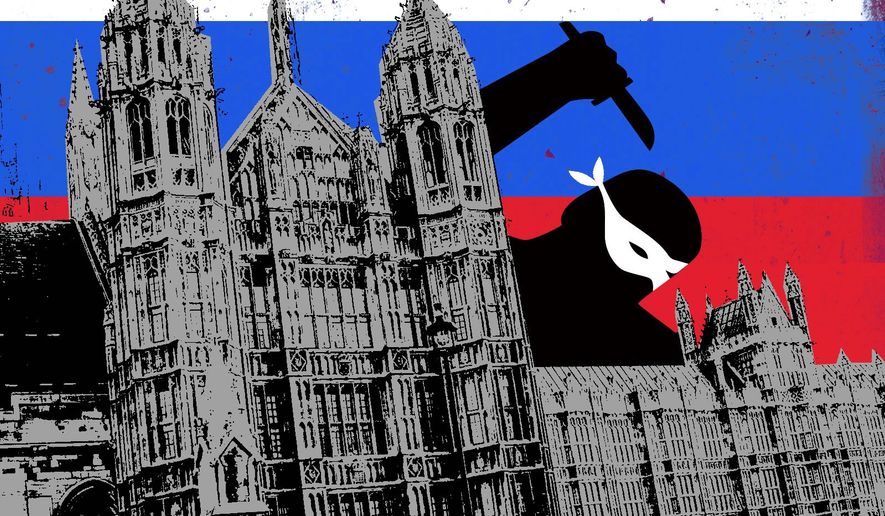OPINION:
This week Vladimir Putin’s United Russia regime was judged and found liable by an international court for its widespread practice of assassinating political opponents.
Fifteen years ago, Russian FSB agent Alexander Litvinenko died of radioactive poisoning in London, the apparent victim of a Kremlin-ordered political assassination.
In 2016, a British inquiry determined KGB security officer Andrei Lugovoy and another Russian, Dmitry Kovtun, deliberately poisoned Mr. Litvinenko by most likely slipping a nuclear isotope into his tea during a business meeting at the Millennium Hotel in London. Shortly after that, Mr. Litvinenko’s wife Marina submitted a €3.5 million claim to the European Court of Human Rights (ECHR), accusing the Kremlin of orchestrating her husband’s murder.
Mr. Litvinenko’s death captivated the world for three reasons. First, the press documented Mr. Litvinenko’s gradual demise as his insides slowly decayed from radiation. Second, Mr. Litvinenko was poisoned with polonium-210, a rare nuclear isotope made almost exclusively in Russia. Third, despite the Kremlin’s denials, the Russian government has made no effort to prove its innocence.
That third element demonstrated Russia’s complicity in the crime, the ECHR ruled on Tuesday. Whereas the 2016 British inquiry concluded Vladimir Putin “probably approved” the assassination, The [ECHR] ruled, beyond a reasonable doubt “there was a strong prima facie case that, in poisoning Mr. Litvinenko, Mr. Lugovoy and Mr. Kotvun had been acting as agents of the Russian state… the government made no serious attempt to provide… information to or to counter the findings of the U.K. authorities.”
The Court’s finding is consistent with what many already suspected, and what the Kremlin wants to subtly project—that no one is safe from Mr. Putin, and that he can get to anyone, anytime, anywhere even when it means assassinating a dissident on British soil who was working for the MI6 secret intelligence service.
Mr. Litvinenko became a target because after defecting to London, he exposed the Kremlin for its involvement in the 1999 Moscow apartment bombings, which killed more than 300 people and injured more than 1000. The bombings have been acknowledged by prominent members of Congress such as Sen. Marco Rubio and the late Sen. John McCain as a false flag attack orchestrated by the FSB to blame Chechen rebels. This empowered Putin to rally support for the second Chechen war while he quietly solidified his base amidst pressuring Boris Yeltsin to abdicate his presidency into exile.
One month before Mr. Litvinenko died, Anna Politkovskaya, an award-winning journalist who reported Russian military abuses in the second Chechen war, was shot dead outside her home. Three years later, in 2009, accountant Sergei Magnitsky died in custody after investigating Russian state corruption. In 2015, opposition leader Boris Nemstov was gunned down after rallying popular support to oppose Russia’s war in Ukraine.
Earlier this week, British prosecutors charged a third Russian in absentia for using Novichok in a failed 2018 assassination attempt against former double agent Sergei Skripal, and in 2020 there was a similar failed attempt using Novichok against opposition leader Alexei Navalny.
Apart from Russia’s government-sponsored assassinations, the Kremlin has engaged in the mass killings of foreign nationals. In 2008, Mr. Putin inspired war in Georgia by supporting pro-Russian secessionists and ordering an invasion. In 2014 the Kremlin defied international law and UN treaties by annexing Crimea while used Russian forces to interfere in eastern Ukraine.
That same year, Russian separatists operating in eastern Ukraine downed Malaysia Airlines Flight 17 (MH17) with a Buk surface-to-air rocket originating from the country’s 53rd Aircraft Missile Brigade, killing 298 people of 17 different nationalities.
In 2019, Andrei Illarionov, a former Cato Institute fellow who once served as Mr. Putin’s chief economic advisor, asserted that shortly after the shootdown, Mr. Putin wasted no time absolving Russia of complicity while exploiting the tragedy to build political capital with Western leaders, including German Chancellor Angela Merkel and Australian Prime Minister Tony Abbott.
According to Illarionov, his former boss had as many as 24 conversations with Western heads of state, parroting a message he sent in a note of condolence to Dutch Prime Minister Mark Rutte, insisting, “This tragedy once again confirms the importance of a peaceful resolution of the severe crisis in Ukraine.”
In 2016, Cincinnati aviation attorney Jerry Skinner filed an ECHR application in association with the MH17 International Legal Committee to sue the Kremlin on behalf of 16 victims from Australia, New Zealand, and Malaysia with 33 next of kin. Last year, the Dutch government also filed an intervening civil suit on behalf of its own citizens, and trial testimony in the government’s criminal case began earlier this month. Mr. Skinner’s civil case also remains pending.
Both cases have the potential of reaching a similar verdict to the one in the Litvinenko case, which awarded Marina £105,000 in damages and another €22,000 in costs. In a statement Tuesday, she said the ruling signaled a “turning point in the appeasement of Putin.”
Although the judgment did not amount to the value of a human life—or reflect the bold, patriotic heroism displayed by Mr. Litvinenko, the ruling was symbolic and a possible prelude to future findings of the ECHR if the evidence supports such a finding. It can also be enforced since Mr. Putin’s regime has assets abroad that can be seized and sold off. If a similar judgment is made in the MH17 case, it could cost the Kremlin millions.
For now, Mr. Putin’s United Russia regime has been judged—and the verdict is guilty.
• Jeffrey Scott Shapiro is a former Washington, D.C. prosecutor and a journalist who investigated the Alexander Litvinenko case on location in London.




Please read our comment policy before commenting.